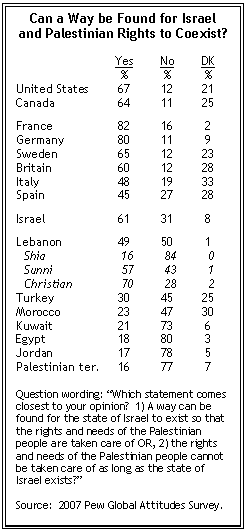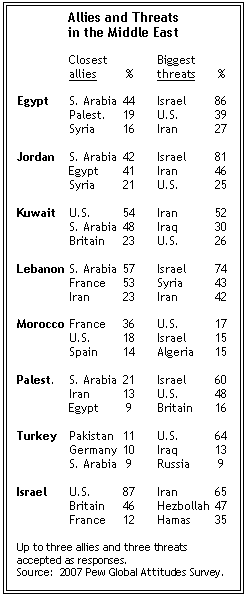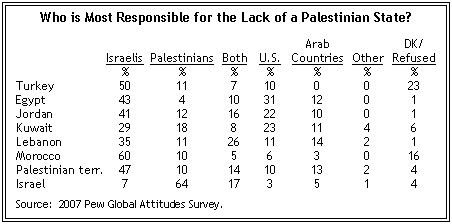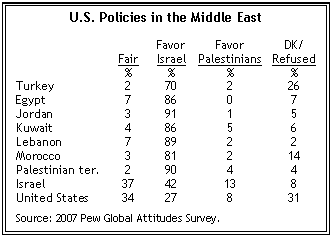by Richard Wike, Senior Researcher, Pew Global Attitudes Project
 While negotiators gathered this week in Annapolis face formidable obstacles — many in the Middle East say they doubt that Israelis and Palestinians can ever find a way to live together — the most recent Pew Global Attitudes survey also reveals that Arabs and Israelis, as well as Americans, share some common concerns, most notably, concerns about Iran. Many in the region see Iran as a growing threat and worry about its potential acquisition of nuclear weapons.
While negotiators gathered this week in Annapolis face formidable obstacles — many in the Middle East say they doubt that Israelis and Palestinians can ever find a way to live together — the most recent Pew Global Attitudes survey also reveals that Arabs and Israelis, as well as Americans, share some common concerns, most notably, concerns about Iran. Many in the region see Iran as a growing threat and worry about its potential acquisition of nuclear weapons.
The chances for progress at Annapolis should be bolstered by the 11th-hour decision by Saudi Arabia, along with 15 other Arab nations, to attend. Respondents throughout much of the Arab world view the Saudis as a key ally and respect Saudi King Abdullah’s judgment in international affairs. Among the Arab nations included in the 2007 Pew poll, both Saudi King Abdullah and the country of Saudi Arabia itself receive overwhelmingly favorable marks.1 Moreover, Egypt, Jordan and Lebanon, as well as the Palestinian territories, all name Saudi Arabia as their top ally.
Doubts about the Peace Process
Pessimism about Israeli-Palestinian relations is common throughout much of the Middle East. More than seven-in-ten Palestinians, Egyptians, Jordanians, and Kuwaitis do not believe the rights and needs of the Palestinian people can be taken care of as long as the state of Israel exists. Lebanese opinions diverge sharply along religious lines: Christians and Sunni Muslims tend to believe coexistence is possible, while few Shia Muslims share this view.
Optimism is more common in Israel, however — 61% of Israelis believe a way can be found for Israel to exist and for Palestinian rights and needs to be addressed. Americans, Canadians, and Western Europeans also tend to believe coexistence is possible. Still, optimism has decreased over the last four years in Britain (71% in 2003, 60% now), Italy (65% in 2003, 48% now), and Spain (53% in 2003, 45% now).
Perceived Threats: Israel, the U.S. …and Iran
In addition to harboring doubts about a resolution to the Israeli-Palestinian conflict, many in the Middle East believe Israel poses a direct threat to their own countries. When asked to list the countries or groups posing the greatest threats to their country, 86% of Egyptians, 81% of Jordanians, 74% of Lebanese, and 60% of Palestinians put Israel among the top three. Among publics that are geographically distant from Israel, however, these fears are considerably less prevalent — in Kuwait (18%), Morocco (15%), and Turkey (7%), fewer than one-in-five respondents name Israel as one of the top three threats.
Many in the region also believe the United States poses a danger to their country. Most notably, roughly half of Palestinians (48%) name the U.S. as one of the three biggest threats — only 12 percentage points less than the number who name Israel. The U.S. is considered a major ally, however, not only among Israelis (87%) but among a slender majority of Kuwaitis (54%).
 While many in the Arab world feel threatened by Israel and the U.S., they also share with Israelis and Americans a common concern: the growing threat from Iran. Roughly half of Kuwaitis (52%), 46% of Jordanians, 42% of Lebanese, and 27% of Egyptians see Iran as a top danger to their country. In both Lebanon and Kuwait, there are sharp differences between Sunnis and Shia on this question. Roughly six-in-ten (59%) Lebanese Sunnis name largely Shia Iran as a top threat, compared with only 8% of Lebanese Shia. In Kuwait, 57% of Sunnis list Iran, compared with only 23% of Shia.
While many in the Arab world feel threatened by Israel and the U.S., they also share with Israelis and Americans a common concern: the growing threat from Iran. Roughly half of Kuwaitis (52%), 46% of Jordanians, 42% of Lebanese, and 27% of Egyptians see Iran as a top danger to their country. In both Lebanon and Kuwait, there are sharp differences between Sunnis and Shia on this question. Roughly six-in-ten (59%) Lebanese Sunnis name largely Shia Iran as a top threat, compared with only 8% of Lebanese Shia. In Kuwait, 57% of Sunnis list Iran, compared with only 23% of Shia.
Meanwhile, in Israel, Iran is mentioned more often than any other threat, including the militant groups Hezbollah and Hamas. Iran also tops the list of threats in the United States (44%), beating out Iraq (31%) and China (25%).
As the Pew survey reveals, concerns about Iran’s nuclear program are widespread in the U.S. and the Middle East. Nearly nine-in-ten Israelis (89%) and 86% of Americans believe a nuclear-armed Iran would pose a very serious or somewhat serious threat to their country. But fears of a nuclear-equipped Iran are common in many predominantly Muslim countries as well, including Kuwait (71%), Lebanon (63%), Turkey (59%), and Egypt (49%).
Many observers argue that these shared concerns about Iran helped bring Arab nations to Annapolis and may make progress on Israeli-Palestinian issues more likely. “The old line — the enemy of my enemy is my friend … is fueling this peace meeting more than any other factor,” remarked former American ambassador to Israel Martin Indyk in a National Public Radio interview.2
Who’s to Blame?
 Although Arab publics remain mostly pessimistic about prospects for the Middle East peace process, and see Israel as a direct threat not just to the Palestinians but to their home countries as well, they are far from unanimous in blaming Israel for the lack of a Palestinian state.
Although Arab publics remain mostly pessimistic about prospects for the Middle East peace process, and see Israel as a direct threat not just to the Palestinians but to their home countries as well, they are far from unanimous in blaming Israel for the lack of a Palestinian state.
While pluralities in five of the Arab nations surveyed say that Israel is mostly to blame for the fact that the Palestinians are stateless, only in Morocco and non-Arab Turkey do half or more take that view. Even in the Palestinian territories, slightly fewer than half (47%) point the finger at Israel. Few, outside of Israel, lay the blame upon the Palestinians themselves but substantial numbers see both sides sharing the blame or volunteer that it is the fault of other Arab countries or, particularly, of the United States.
Figure
 The perception that America is not an evenhanded broker in its dealings with the Middle East is widespread in the region, and, indeed, elsewhere in the world. Huge majorities in Jordan, the Palestinian territories, Lebanon, Kuwait, Egypt and Morocco — more than eight-in-ten respondents in each of these countries — express the view that U.S. policy in the region favors Israel too much. Even in Israel, 42% agree. For their part, Americans overwhelmingly — by a margin of more than four to one (49%-11%) — express sympathy for Israel over the Palestinians, a preference ratio that has varied little over four decades.3
The perception that America is not an evenhanded broker in its dealings with the Middle East is widespread in the region, and, indeed, elsewhere in the world. Huge majorities in Jordan, the Palestinian territories, Lebanon, Kuwait, Egypt and Morocco — more than eight-in-ten respondents in each of these countries — express the view that U.S. policy in the region favors Israel too much. Even in Israel, 42% agree. For their part, Americans overwhelmingly — by a margin of more than four to one (49%-11%) — express sympathy for Israel over the Palestinians, a preference ratio that has varied little over four decades.3


